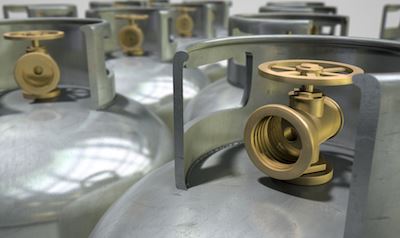Many furnaces and appliances use either natural gas or propane as a fuel source.
Natural gas is found underground and contains several different gases, including butane, propane, and methane. It can be in liquid form, or as a compressed or uncompressed gas.
Propane gas, also called liquefied petroleum gas or LPG, is stored as a liquid after it’s separated from natural gas.
For the home, you will find appliances that work on either natural gas or propane. The two are not interchangeable; each fuel source requires special gas utilization fittings. If you want to switch between the two, you’ll need a conversion kit for the appliances’ manufacturer for the installation process. For electric appliances like heaters, ovens or water heaters, there isn’t a conversion process; you’ll need to replace the appliance with one specifically made for natural gas or propane.
Natural gas is a utility that is only available in certain areas, bringing the gas into the home via underground pipes. Propane is stored in tanks that need periodic refilling and replacement. Some containers are portable, while others are larger and can be buried underground. Having a tank buried is similar to having a natural gas pipeline connected to your home.
If you convert from propane to natural gas, or if you decide to stop using propane and switch to electric appliances, you’ll need to get rid of your propane tank or have it emptied out and leave it in place. Removing it from underground is difficult, but you can sell it to another when the process is finished.
The advantage of propane is that it can be delivered anywhere. Natural gas depends on the pipeline and whether it’s available in your community. Propane depends on delivery for both installation and refill. You may run out of fuel after a large storm or another emergency. Since natural gas is connected through pipes, it’s always available.
Propane is usually more expensive than natural gas, but the same amount produces about twice as much heat. The economics of using one versus the other largely depends on where you live. Both types, however, are more efficient and less expensive than electricity in many regions. Having a new natural gas line installed can be costly, but the investment could reduce your utility bills more over time.
Your decision for an upgrade may depend on the appliances you already have in your home. A furnace has a life expectancy of about twenty years, no matter if it operates on natural gas, propane, or electricity. Electric ranges can last up to fifteen years. But if you’re remodeling and upgrading appliances in your home, it may be the perfect time to upgrade your fuel system too.
Natural gas and propane are both colorless, odorless gases. To help detect gas leaks, manufacturers add a harmless chemical called mercaptan to give it its distinct scent of rotten eggs or sulfur. If you notice the smell in your home, put out any flames and go outside. Then call 911 and wait for emergency crews to ensure your home is safe.
Have additional questions about the best way to fuel your home? Thinking of upgrading your appliance to natural gas or propane? We can help.

